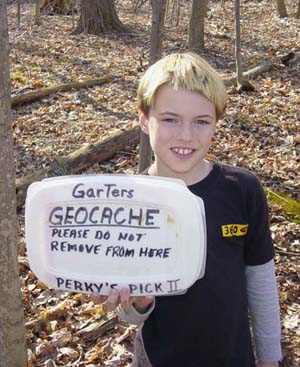
Think of it as a global Easter Egg Hunt. Think of it as hide-and-go-seek mixed with a trip to the park, mixed with the Internet and other modern technology. Whatever makes it easiest to understand, Geocaching is a craze that is catching major attention. Thousands of people in more than 200 countries are discovering this new adventure game that was launched in May 2000. Locally, Rachael Woodams, communications director for the New York Geocaching Organization, said there are 20 caches within an eight-mile radius of the Village of Hilton. Geo-huh? Anyone interested can get involved by searching out a cache, or by hiding one. Once a cache is hidden, its coordinates are posted on the Geocaching website along with some pertinent information. Got game? The player then programs the coordinates into the GPS unit and takes off. Most caches are hidden in public parks. A cache is usually a canister containing a small treasure of under $3, such as child's toy. The joy doesn't come from the prize, it comes from the search. A cache cannot be buried, but it should be hidden. Since GPS units can only provide an approximate direction, game players get to see a lot of whatever area the cache is located in. Once a cache is found, the player may take the prize and replace it with another. The intent is to leave the cache viable for other players. Each cache has a logbook that every player is asked to sign. It is important to first check the degree of difficulty before taking off on a geocaching adventure, because caches range from easy finds, to those that require rock climbing or scuba gear. Like in other games, variations of Geocaching are popping up. Some of these are:
Gettin the gear "The only difference between a really cheap system and an expensive one is bells and whistles," Woodams said. Get in the game Her search for caches has taken her throughout New York and to Ohio, Pennsylvania, Vermont, Nevada, Massachusetts, North Carolina and Canada. In total, Forbes has uncovered 358 caches. "I've always been into hiking," Forbes said. "This is a great way for me to discover many different parks." Woodams, of Hilton, learned about Geocaching for the first time on the Internet. She is a professional senior caregiver. She began playing in February 2003 and has already discovered 225 caches. "I like the idea of finding something that other people might pass by," Woodams said. She said the game is starting to be recognized by organizations such as the Boy Scouts and in Physical Education departments in many different school districts. "It combines the outdoors with technology," said Woodams. "So a kid who only likes to play video games might take a GPS unit and go for a walk." Give back |
